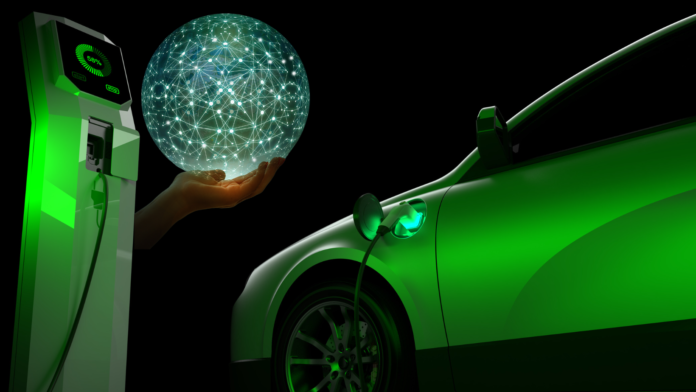The electric vehicle (EV) industry, while significantly lowering carbon emissions globally, is still in a battle of adoption against motor vehicles due to a lack of accessibility and functional EV infrastructure. With the global climate crisis well underway, more consumers’ attention has been redirected toward a cleaner, greener focus. Consumers are beginning to see the value in steering away from petrol and diesel-fueled vehicles and toward battery-powered vehicles that utilize renewable energy.
A recent report from the International Energy Agency cites electric vehicles as the key to decarbonizing road transport, a sector that accounts for 16% of global emissions. Although electric vehicles may be the sustainable option, the industry is not without its challenges, nor has it overtaken consumer interest in the original motor vehicle — yet, that is. Industry-wide challenges are stunting progression and must be addressed before we can expect to see widespread adoption of the EV. But blockchain technology may be the new secret ingredient to solving these growing pains and positioning the electric vehicle as the go-to mode of transportation.
EVs’ current challenges
Like any emerging industry with initial challenges that must be solved, the EV industry is no exception. The World Economic Forum found that the initial high cost of an electric vehicle, limited access to charging infrastructure, and limited driving range are some of the key barriers preventing drivers from making the switch to EVs. Another speed bump that EV adoption is facing, is charging infrastructure lacking the foundations necessary for widespread use. These charging issues include the increasing cost of charging, rural areas’ lack of infrastructure, and universal fast charging still being up for debate. These obstacles can be seen on a global scale and threaten to slow progress toward widespread adoption.
Climate change is progressing at a rapid speed, and the lack of finance allocated to the EV space only worsens this. Increased investment in infrastructure as well as lower entry costs for passengers looking to make the switch from low-cost internal combustion engine (ICE) vehicles to zero-emissions vehicles (ZEV), is critical for further uptake. The increased demand for sustainable transport is suggestive of a bright future for the EV industry, but these obstacles must be addressed on a global scale before this can become a reality.
The negative impact of fossil fuel-powered vehicles is evident globally, but the EV industry must be inclusive of all nations and all backgrounds in order to see emission rates lowered worldwide. This can be achieved through significant investment in charging infrastructure as well as opening financial access for drivers, particularly in rural areas, which will create incentives for individuals to make the switch — and blockchain is integral to this.
Leveraging blockchain to solve problems
Blockchain technology is built to promote inclusivity, which makes it a great candidate for solutions in the EV market. Innovative solutions are critical to addressing the lack of trust that exists between EV owners and charging providers, the need for more infrastructure, and the high initial cost and existing driving range of EVs. With the decentralized makeup of its technology, blockchain holds the potential to solve these challenges.
The lack of trust that exists between EV owners and charging providers can be solved through secure and transparent payment processing, made possible by smart contracts. The smart contract ensures that users are not overcharged and similarly that charging providers receive their payment swiftly. This adds an unprecedented layer of accountability.
The need for more charging infrastructure is a larger issue stunting widespread adoption, particularly within developing countries and rural areas. There are high costs attached to the installation process and managing the consistent maintenance required to run a functional charging network. Building these charging stations on blockchain will streamline processes such as automated payments through the use of smart contracts while providing a larger and more efficient EV charging network. Users can then charge their EVs and experience a seamless checkout process. By increasing the number of charging stations in rural and urban areas, the “range anxiety” of EV users will decrease, increasing the level of trust for those who are curious and on the fence about making the switch.
The high initial cost was another prominent issue within the marketplace. The introduction of the sharing economy to the EV industry showcases another innovative solution blockchain has to offer. The sharing economy functions as a platform that allows individuals to access products collaboratively. Users will share resources such as the vehicle itself, and its respective services. This provides an alternative to traditional ownership, meaning users can choose to share their vehicle or rent it out to others. The sharing economy can be made possible through staking mechanisms, opening doors to those who cannot afford to purchase a tuk-tuk independently. It provides an opportunity for users worldwide to take a stake in the future of EV adoption on the blockchain.
Looking forward
Something needs to be done in order for our planet to make a full recovery from the consequences of the climate crisis. Although significant efforts have been made to promote accessible sustainable travel for all, it is important that countries within the developing world are not excluded from these efforts. For instance, recent research from InsideEVs reports that more than 2.6 million new passenger plug-in electric cars were registered in Europe, whereas in countries such as Brazil, India and Indonesia, fewer than 0.5% of car sales are electric.
It is clear that we need to increase the sale of electric vehicles internationally and prioritize the progression of developing countries to see global adoption of the EV, and to further lower carbon emissions across the globe. Blockchain offers a unique solution to make this possible and includes all nations regardless of financial eligibility and accessibility.

